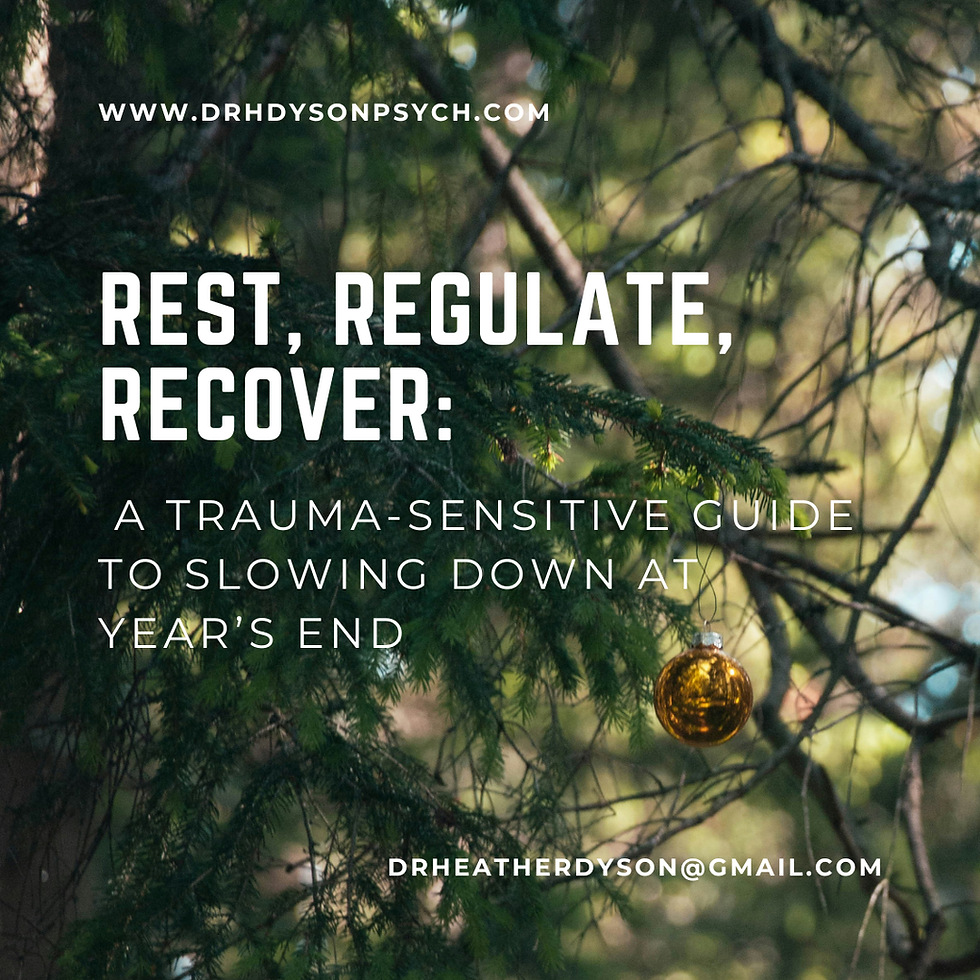Six tips for supporting Veterans with fireworks
- Dr Heather Dyson

- Nov 5, 2022
- 4 min read
Updated: Oct 27, 2023

Whilst for many of us, this time of years can be magical, for veterans it can be torturous. The sound of fireworks, which spark joy and awe for civilians, can leave veterans experiencing increased physiological arousal, anxiety, irritation, anger, and even flashbacks. It may surprise any civilians reading this that the smell of lingering smoke, flashes of light, loud explosions, shrill whistles, and crackle of fireworks are similar to the sights, sounds, and smells, of warfare.
For individual’s who have experienced warfare, the part of the brain which monitors safety is already more heightened than the general population. This means that the brain of a veteran has been “trained” to look out for any signals of “danger”. Whilst this ability is extremely adaptive during an actual warzone as it keeps the individual safe, it is often debilitating during this time of the year when their brains believe they are hearing mortars, grenades/bombs exploding, and tracer rounds colouring the night sky. The result can be terrifying, leaving the individual being unable to fully distinguish the past from the present.
I have been fortunate enough to have spent over half of my working life supporting veterans. During those times, many of them were willing to share their experiences of fireworks night and how they “managed”. Below are five tips that helped them to cope with this time of the year.
1. Being with loved ones/trusted friends
Being around individuals who have insight into what is going on for you not only destigmatises the experience (they won’t judge you), they are also able to help keep you distracted and reassured throughout the night.
2. Orientating to time and place.
It may sound strange but verbalising where you are, and when you are, can be extremely helpful in remaining grounded and connected with the present. Whilst our brains are one of the most incredible organs in our bodies, they can be easily tricked by our nervous system to think that we’re back in a warzone. By saying out loud your location, the date, the time, and that you are safe, it can remind your brain that whilst your body thinks it’s back in a warzone, that in reality you are safe.
Here are some orientating phrases you could try…
I am at home with my friends/family. I’m not in a military compound.
I am in [address], in [country]
I am wearing jeans and a t-shirt. I am not wearing a military uniform. My jeans are blue. My T-shirt is white.
Today is [date]. I am at home. I AM SAFE. I know I am safe because…
The bangs I can hear are fireworks. They are not rockets or tracer missiles.
3. Using scents
Scents have the power to take us back to places in time in a way that visual memory doesn’t. Is there a smell that helps you to remain calm or stay grounded? I have known veterans to take around smelling salts, tiger balm, a handkerchief which smelt like their horse, their wife’s perfume, to more simple things like lavender oil. Making yourself a hot chocolate, lighting a scented candle, snuggling up to a pet, all these scents can help you to remain orientated to the present and lower anxiety.
4. Abdominal Breathing
It can sound bizarre, possibly even frustrating, when psychologists tell you to “breath” but abdominal breathing is by far the most effective strategy when it comes to moderating and managing anxiety. As best as you can, try to breath in from low down in your stomach for a count of four, hold for two, and breath out for five. YouTube have some great videos on abdominal breathing for anyone wanting a more visual guide on how to breath from your diaphragm. For more information about the importance of breathing, check out my post à https://www.drhdysonpsych.com/post/the-importance-of-breathing
5. Move around
Just as our cognitions/memories can be taken back to our past experiences, so can our bodies. Our bodies may feel stuck or wound up and tense. Moving around your room, stretching, burpees, squatting, walking-lunges, practicing headstands, all of these activities will help remind your body that it is safe in the present, as well as alleviate some of the adrenaline.
6. Access mental health support from a trained professional or organisation.
For some individuals, these tips may be enough to help them manage their distress at this time of the year. For others, it may highlight that they need some extra support. Combat Stress have a 24-hour Helpline for mental health advice and support – 0800 138 1619. You can also text them on 07537 173 683. They also offer free treatment for the symptoms of post-traumatic stress disorder (PTSD) and complex-PTSD.
Alternatively, you can also consider speaking to your GP and accessing specialist veteran support through the NHS. Don’t forgot to remind your GP that, as a veteran, you are able to access priority care.!
Finally, if neither of those suggestions are possible, you could consider accessing therapy privately with a specialist psychologist. If that is something that might be of interest to you, please feel free to email me at drheatherdyson@gmail.com.
Photo by Kristian Løvstad on Unsplash




Comments